Student Blog
Lamoni
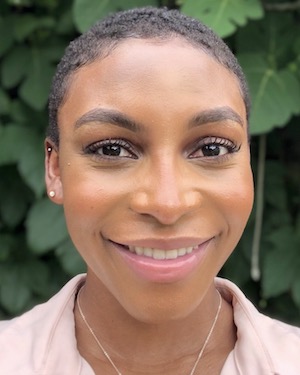
Not All Goodbyes Are Bitter ⟩
May 10, 2021, by Lamoni
Beginnings and Endings Diversity What are OS/OT?
I cannot believe graduation is this week! We often view goodbyes as a gloomy moment, but it does not have to be that way. Some goodbyes are actually good! For me, this goodbye means that it is time to close one chapter as I transition to another. But it does not necessarily mean that I am parting ways. Everything that I have gained will stay with me — the friends, memories, experiences, knowledge, professional relationships. I will cherish them no less than I do now.
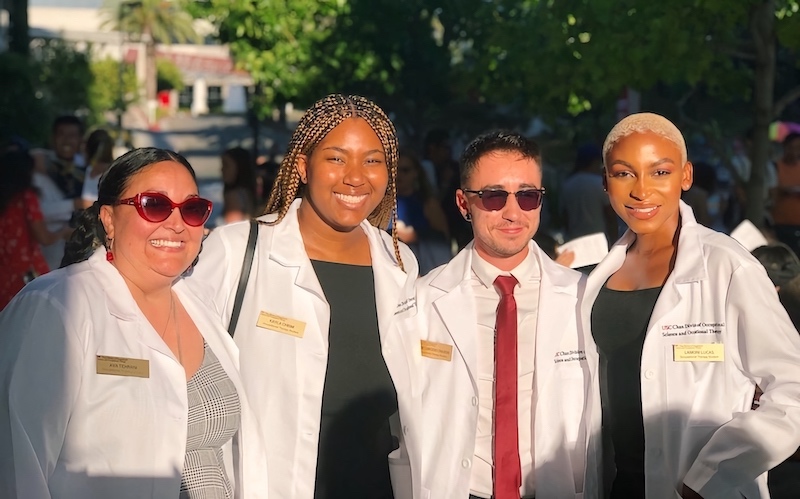
Faces of OT
Here was August of 2019 at our whitecoat ceremony. That was an extra special day because we defeated the treacherous (I mean, “intensive”) first summer! We were glowing because we finally got some rest. After putting on that whitecoat, my OT journey officially began. I stood next to some pretty Rockstar people too! Knowing that I would enter a career field with them was comforting. I have found that It is the people around you that truly make your experiences great.
To all of my friends (within the program and outside of it), thank you for being by my side, thank you for understanding when I missed your call, thank you for staying on the phone with me for 3+ hours when I returned your call, thank you for sending me housewarming gifts when I first moved to California, thank you for sending me words of encouragement while I studied for the GRE, thank you for studying at Norris Library with me and creating bizarre mnemonics, thank you for going to the flower district with me and helping me become a plant mother, thank you for game nights and movie nights. Thank you for being my friend.
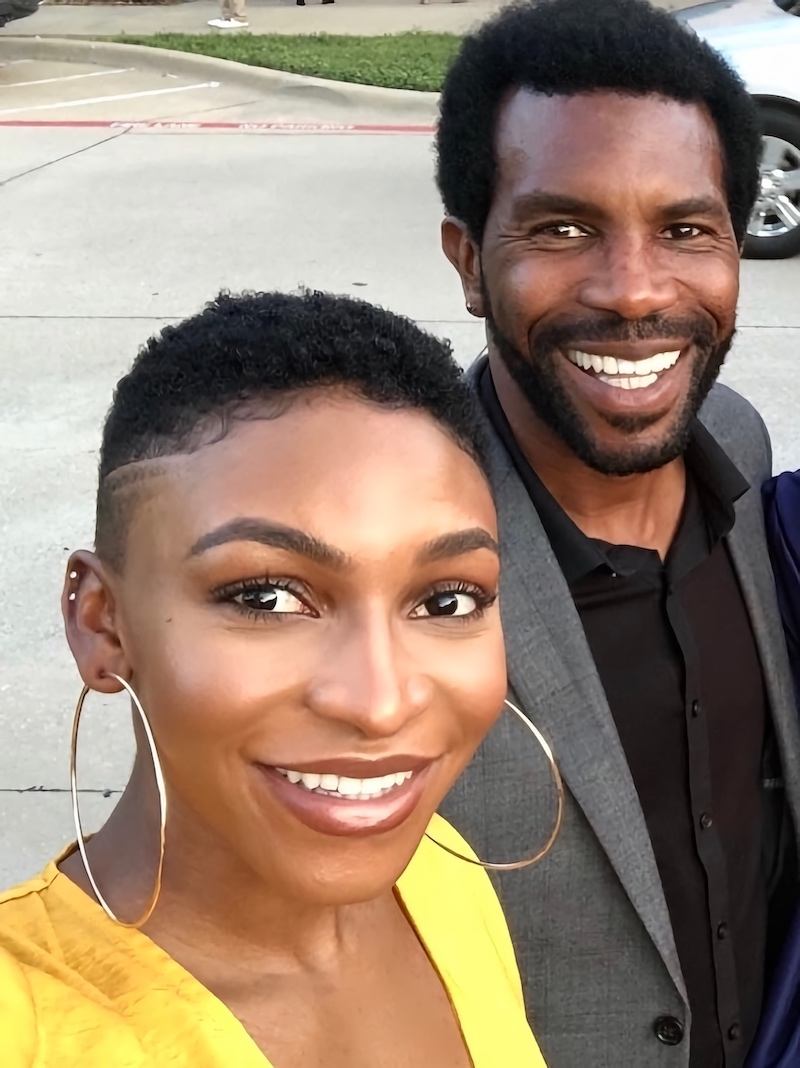
My dad (aka my heart) and I
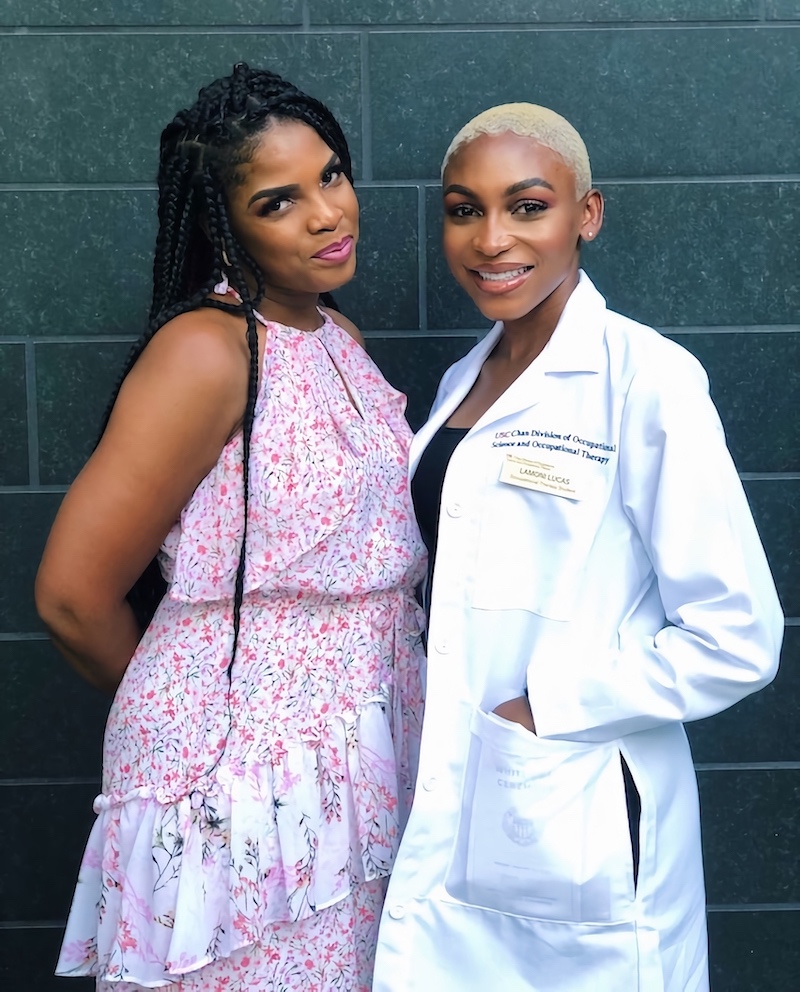
My mom (aka my soul) and I
Not to be dramatic with the picture captions but, my parents are my Day 1’s! My biggest supporters! My everything! Thank you to my mom and dad for all that you have done and continue to do. Though neither of you pursued college and thus, do not have first hand experience about the challenges, you have done everything in your power to support my higher education (even if that meant accepting that I would move 2k miles away TWICE). No matter how far, I have always felt your warmth. I am so incredibly thankful to have parents like you. Nothing I can say or do will accurately show how much I love you.
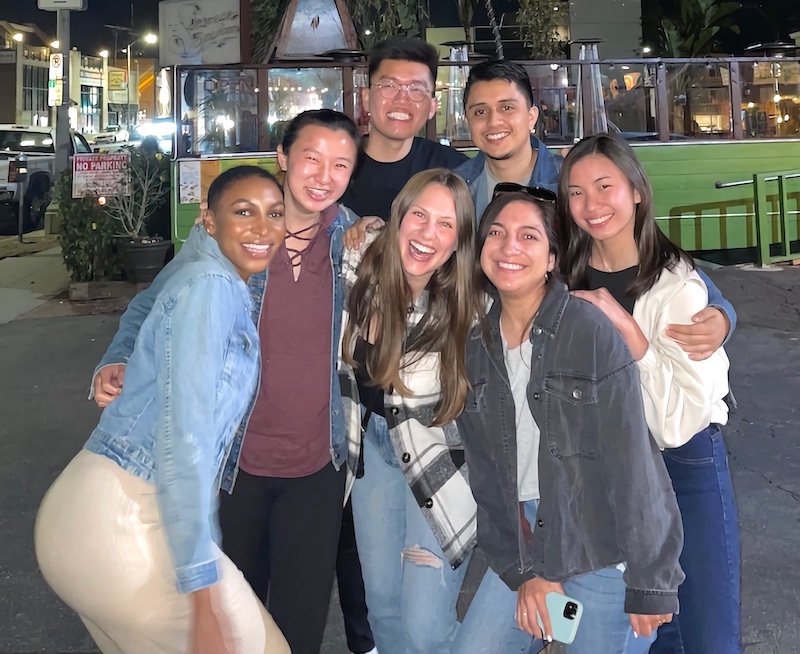
Your favorite squad
To my team: We did not know exactly what we were signing up for. Chan has never had a set of ambassadors through a COVID pandemic. But, we did that! Along with LOTS of help from Kim Kho (the most caring supervisor ever), we figured it out. Thank you all for being so helpful, collaborative, and fun! It has been a pleasure to work with you, share a group chat with you, and share a meal with you. This experience would not be the same without you.
I will admit, my eyes watered a bit while reflecting and writing out my thank you’s. But, it was happy tears! I just feel so incredibly grateful to have such amazing people in my life. My experience as a USC Chan Master’s student was phenomenal because of YOU! Thank you to everyone that has read my blogs, left comments, and written emails. It has been so special to connect with you all in this way. Keep on fighting on!
With all my love,
Lamoni
⋯

Being Black in OT: The Impact On My Future Black Clients ⟩
April 7, 2021, by Lamoni
Two weeks ago, I attended a livestream event by the Summit Performance Indianapolis called “Black Voices in OT.” It consisted of a play that highlighted common experiences of Black occupational therapy students and practitioners. Many of these experiences were negative. It was filled with micro-aggressions, insensitive statements, and harmful actions by peers, professors, and bosses. The structure of the play was interesting because it took place over a zoom call; It was two OT practitioners and one OT student having a casual check-in to release all of their frustrations regarding the racism that they experienced during work and at school. The purpose of the play was to bring attention to the fact that Black OTs have to navigate racism all while trying to balance the demands of being a graduate student, care for clients to their full capacity, maintain relationships with peers and coworkers, and remain in a positive attitude. It requires a lot of energy and it can feel even more depleting when there is not a shoulder to lean on or an ear to listen.
As I watched the play and heard the compilation of several upsetting stories which were extracted from actual surveys taken by Black OTs and OT students, I did find relief in the fact that they had each other. Between their sighs and head shakes were also moments of laughter. It reminded me of my own conversations with my family and Black friends. To be amongst people with a shared identity and shared experiences can be very therapeutic. It can be a source of reassurance and confidence. It can be the difference between getting knocked down and staying down or choosing to stand up again.
USC Chan’s incoming class of 2023 is the most racially diverse class yet. I can only hope that an increase in diversity is true for several other occupational therapy programs across the nation because we need it. I believe more representation in the field would decrease the number of negative experiences highlighted in the play. Besides that, I think being Black in OT comes with many positives for Black clients. Currently, and rightfully, the Black community has a lot of mistrust towards the healthcare system. This is due to a long history of medical abuse, neglect, and exploitation. As more Black people enter healthcare professions, trust can be restored. With trust comes more buy in; clients may be more likely to fully participate during sessions and to listen to the OT’s recommendations. This can translate to greater improvements in their condition, fewer hospital re-admissions, etc.
As a Black OT, you will be a practitioner that your Black clients can relate to. Being of the same culture typically means that there will be several shared experiences, maybe similar upbringings, or interests. This is another way to build rapport and establish a strong, trusting relationship. Additionally, you can be a source of emotional healing. We typically think of healing in terms of health conditions, but we have to remember that occupational therapy is holistic and takes into account emotional health. Racial injustices are constantly taking place around us and this undoubtedly takes a toll on Black clients’ wellbeing. If you are working in an inpatient rehab facility and your Black client does not have friends or family around to talk about what they may have recently watched on the news (for example, Black Lives Matter marches), your presence and the assumption that you understand racial trauma can promote healing. Even without speaking, you may be a source of comfort.
I will be graduating next month and while I am simply excited to soon enter the workforce in this amazing profession, I am equally excited to serve my community. I think about the general mistrust towards the healthcare system and how extra doubt may be present towards a field like OT. Many people do not know what occupational therapy is and what occupational therapists do, thus, mistrust may be amplified. Having someone from your background explain the profession, become your practitioner, and lead your interventions is not only beneficial for Black clients but for the occupational therapy profession overall. Yes, we may experience some negative moments, but I am hopeful that the good will outweigh the bad. I am also hopeful that the number of Black OT students and practitioners will rise and, in return, cause the number of unpleasant moments to fall. Continue to push towards diversOT, it benefits us all and can only make our profession better.
⋯

The First Summer ⟩
March 12, 2021, by Lamoni
After acceptance letters went out, I have received lots and lots of questions about the first summer of the entry-level Master’s program. This is the time of a major transition — it may be your first time having a graduate school workload and you are wondering how to tackle it, perhaps you want to know if you can have a job during this period, or you are curious about how to maintain a social life. Before starting the program, I had these questions too. Now that I have completed that summer, I would like to talk about what it was like and answer some of those questions. Hopefully, this will ease some nerves! *note — this blog describes the layout of my summer but the program/your schedule may shift.
“How intense is the first summer?”
The initial summer is quite busy. I think it would be helpful to first explain what that summer looks like. For the first half of the summer, you will take Foundations: Kinesiology. This course reviews joint and muscle functions and teaches students how to apply biomechanical principles to everyday activities. For the second half of the summer, you will take Foundations: Neuroscience. Here, you will learn how to analyze daily living tasks through the lens of neural function. This course also reviews pathological conditions that interfere with performance. During the entire length of the summer, you will take Foundations: Occupation and Foundations: Creativity, Craft, and Activity Analysis. The Occupation course is an introduction to occupational therapy history and practice. During the Creativity course, you will have the opportunity to engage in craft projects, explore your creativity and analyze performance.
In total, you will be taking four courses in an 8 week timespan. Only three courses will happen at once due to Kinesiology and Neuroscience being split into first and second half. The class times are three hours long. Kinesiology and Neuroscience happens during the mornings while Occupation and Creativity takes place during the afternoons. In addition to the Kinesiology and Neuroscience lectures, there will be labs. This is where you will complete activities and worksheets as well as receive direct support from teaching assistants. This time is used to clear up any confusion you have about the material.
I explained the schedule to give a picture of what weeks will look like during the summer. As you can imagine, you will be frontloaded with a lot of information. These courses will serve as your foundation as you move through the program. Many classes will draw on the information that you learn here to introduce you to new and more in-depth concepts.
All in all, I would say that the initial summer is intense. Personally, I believe it is the busiest semester of the entire program. Not only are you learning a lot in your classes, you are navigating life as a graduate student which may come with new responsibilities, you are forming connections with professors, and you are creating new friendships. There are many things going on at once.
“Do you recommend working during this period?”
I chose not to work during my first summer. I made this decision because I did not want to overwhelm myself. I wanted to be sure that I had enough time to study AND rest. It helped me to review the material that we learned each day. I took an hour or two off once I got home to simply de-stress and relax. Then, I would review my notes. I know that I would feel exhausted if I did not take that time to rest and I would feel unprepared for the next class if I did not have the time to review my notes at the end of each day. I also needed my weekends to re-energize. Therefore, working was not feasible for me.
However, I would not say that it is impossible to work. My one piece of advice would be to limit your hours and, if you can, work some place that is flexible and might allow you to study.
“Am I expected to join student organizations during the summer semester?”
You are NOT expected to join any student organizations at this time. I received several emails from new students that were worried about how it would look if they were not “involved.” People typically begin to join student organizations during the Fall and I would say that most of my class did not join until the Spring. I did not know of anyone that was a part of a student organization during the summer. Maybe, the most that they did was get on the email list. Do not stress about this!
“Did you have time for a social life?”
This is probably the most common question that I received as it relates to the first summer. I would answer this by saying — You will have time for a social life if you make time for a social life. We often push leisure and pleasure off to the side and start to focus only on the work that we need to get done. That will easily set yourself up for burnout.
Did I take weekend trips out of state without ever looking at my notebook? No. But, did I have movie nights, go out for dinner, participate in game nights, and meet up with friends? Yes! It is so important to do this! You are human and you are not meant to work, work, work. Do not deprive yourself of simple pleasures. Even if you cannot take an entire day off to relax, fit it in at some point. You can set aside time to meet with your study group on Sunday morning and as a reward, you all can all head to the beach afterwards. You can study chapters 16-18 then go watch an episode of something with your roommate then return to chapter 19 when you are done. Do not feel guilty about taking a break. I promise that it is beneficial. Time to rest and/or socialize is productive too!
I hope that this blog post gave you a better idea of what the summer will look like and what you can expect. Yes, it is very busy. But, it doesn’t have to take over all facets of your life. There will still be time for play as long as you make it a priority (and you absolutely should)!
⋯

My Fieldwork in a “non-traditional” setting ⟩
February 12, 2021, by Lamoni
My previous blog post was about being comfortable with uncertainty as I waited to learn where I would be placed for fieldwork this semester. Update: I have been placed and I have completed my first week! I am in what we would call a “non-traditional” setting. The work that I will be doing is not happening in a clinic or hospital and the clients do not have diagnoses. In fact, I will be completing my work remotely because it is research. I am at SOLA Peace Center working under Dr. Kristy Payne and regularly meeting with Dr. Gelya Frank. SOLA is a non-profit organization that has recently formed a collaboration with USC. SOLA’s primary goal is to create more peaceful and just communities. It is based out of South Los Angeles and primarily serves the economically disadvantaged. The organization recognizes that poverty is a form of structural violence and due to a lack of resources, children in these communities are often experiencing occupational alienation. As occupational therapists, we know the many benefits that occupation and occupational opportunities bring to our lives. Thus, we can imagine how detrimental the lack of occupational opportunities can be. Without proper tools, skills, and resources, children are limited in their possibilities. My role as a level II fieldwork student here is to strengthen the effectiveness and reach of SOLA in the community by attending community meetings, completing observations, and researching best practices. To be productive in the community, SOLA must be backed by evidence.
Though I am not writing treatment plans and submitting documentation, the work at SOLA is that of an occupational therapist. I ask the questions, “what is preventing children in this community from engaging in meaningful occupation?” and “How can I change that and help them be successful?” The overarching theme of occupational therapy remains – how can I help this person do what they need to do and want to do (despite disability, illness, and/or circumstance)? The work at SOLA is a combination of pediatrics, wellness, and mental health. Children learn ways to regulate themselves, life skills such as peaceful communication and conflict resolution, and goal-setting for self-improvement. Further, children learn how to be leaders in their community, how to take social action, and how to make their voices heard. There is no selection process—anyone that wants to join is able to do so. What I love most about SOLA is their focus on and integration of occupational justice. SOLA aims to give children exposure to new possibilities and the tools that they need for success in school, in the workforce, and in society. The mission is to help those in the community feel like they have agency, particularly the children that are often overlooked.
I am so excited to acquire and develop new skills while working with SOLA Peace Center! The insight that I gain will not only help me become a more thoughtful, well-rounded occupational therapy practitioner, I will be assisting in leveling an unfair playing field while doing so. Everything that we do with intention is occupation. That means that occupational therapy fits into much more than the distinct areas of adult rehabilitation, pediatrics, and mental health. We are a profession with so much value and so much to share. Let us continue to expand and bring our expertise where it is needed.
⋯

Being Fine with Uncertainty ⟩
January 15, 2021, by Lamoni
I am back and it is time for a new semester! Except I have no idea what I will be doing. Typically, we learn about our fieldwork placements at least one month before the start date. However, the pandemic has caused many changes. Several sites are delaying when they will take students, changing their format to telehealth, or they are not taking students at all. Already, our first level II fieldwork has moved from Summer 2020 to Spring 2021 but, as we all know, the virus has not slowed down. The fieldwork team has been working overtime but myself and nearly 30 other students still do not know when and where we will be. Any other time, I would be very anxious about the whole situation, but COVID-19 has taught me to take everything day by day. There are things that are out of my control therefore, I have no choice but to take a step back. *I want to acknowledge the privilege that I possess. I understand that my ability to not worry at a time like this means that I am in a very fortunate spot.
Being comfortable with the unknown did not happen overnight. Remember when we all thought COVID would be over in 3 weeks? I thought this would me a mini, much-needed break and that we would all return to school and work shortly. As time went on (long after 3 weeks), everything began to feel out of my grasp. I had no answers for anything. Now that we are less than 3 months short of it being a year and I do not have a placement, I have finally relinquished power and I have become more comfortable with not having an answer. To do that, I had to control other things in my life and be more intentional about them. For the things that were out of my hands, I had to create more things to hold on to. For example, I decided to read more books for leisure and to create a fitness routine. Within the past four weeks, I have already read three books. I have also gotten into such an exercise groove that I have to force myself to take days off. Additionally, I have been more intentional about checking on my friends and family. When I was busy with work, school, and research, I did not reach out often and I would take days to respond to their texts or calls. Now, I have more than enough time to build strong relationships and habits. Therefore, when I finally start fieldwork, these habits will be so engrained that I will keep them up.
Another way that I have learned to be more comfortable with my current situation is by putting it all into perspective. I am not dealing with this alone. The pandemic has changed the lives of everyone. If you are struggling with inconstancy and unpredictability, your mood is lower than usual, or your motivation has dropped, just know that others are having these feelings too. There is no “normal” way to feel because we have not experienced anything like this.
I typically like to create bullet points of tips and tricks but this time, my main advice would be to construct some sort of structure to your day and create small, attainable goals for yourself. The outdoors still has a big question mark on it but having a routine and something to work towards is important. Maybe your work or school goals cannot be accomplished at this time, but there are plenty of other ways to find fulfillment. We are often told to do our best but It is also okay to simply do what we can.
⋯





